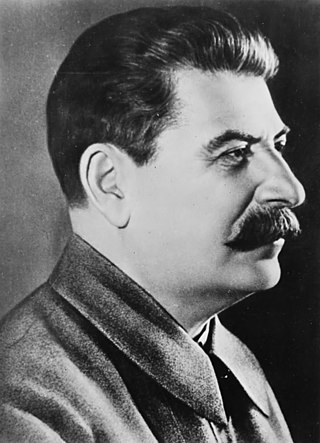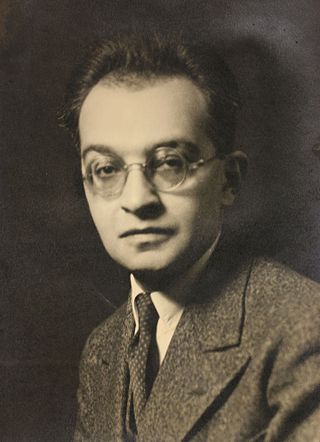This article needs additional citations for verification .(January 2018) |
The Leninist League was a communist political party in the United States. It published a newspaper called "In Defense of Bolshevism".
This article needs additional citations for verification .(January 2018) |
The Leninist League was a communist political party in the United States. It published a newspaper called "In Defense of Bolshevism".
The party's origins started in the Revolutionary Workers League of Hugo Oehler, which had originated in the Trotskyist movement, but rejected Trotskyism in 1937. A few members felt that it had not gone far enough, and, led by George Spiro (known as "Marlen", a portmanteau of Marx and Lenin), split in early 1938 to form the "Leninist League". The group was often referred to as the Marlenites after their leader's pseudonym.
Spiro aimed to destroy Trotskyism, calling Leon Trotsky an agent of Joseph Stalin and claiming that even the Revolutionary Workers League was "an enemy of the international working class. It is a sabotaging agency in the struggle of exposure and destruction of the Stalinist reaction." [1]
While initially a tiny group, a small degree of press attention enabled the League to grow slightly. It published several books, and remained hostile to other left-wing currents. Its 1937 publication, In defense of Bolshevism; behind the betrayal in Spain, declared that it was "against the policy of 'correcting' Stalinist reaction, the counter-revolutionary social democracy, and also Lovestoneism and Trotskyism which are separated from Leninism by a narrow but very deep gulf!" [2]
The League declared World War II to be a "phony" war, obscuring the real war of Western capitalists and Stalinist state capitalists against the proletariat.
In 1946, the League renamed itself the Workers League for a Revolutionary Party, and its publication as the Bulletin. [3] It became critical of both Leninism and Marxism. Spiro began to focus his work on antisemitism among the left, and disagreement about its direction caused the group to dissolve itself in about 1950.
One person who was influenced by the Marlenites was a young Noam Chomsky, who was introduced to the group, partly as a result of the history professor Ellis Rivkin. He was impressed by their characterization of World War II as a "phony war" instigated by both by Western capitalists and the Soviet Union. [4] He "never really believed the thesis, but... found it intriguing enough to try to figure out what they were talking about." [5]

Leninism is a political ideology developed by Russian Marxist revolutionary Vladimir Lenin that proposes the establishment of the dictatorship of the proletariat led by a revolutionary vanguard party as the political prelude to the establishment of communism. The function of the Leninist vanguard party is to provide the working classes with the political consciousness and revolutionary leadership necessary to depose capitalism in the Russian Empire (1721–1917).
Marxism–Leninism is a communist ideology that was the main communist movement throughout the 20th century. Developed in Russia by the Bolsheviks, it was the state ideology of the Soviet Union, Soviet satellite states in the Eastern Bloc, and various countries in the Non-Aligned Movement and Third World during the Cold War, as well as the Communist International after Bolshevisation. Today, Marxism–Leninism is the ideology of the ruling parties of China, Cuba, Laos and Vietnam, as well as many other Communist parties. The state ideology of North Korea is derived from Marxism–Leninism. Marxist–Leninist states are commonly referred to as "communist states" by Western academics. Marxist–Leninists reject anarchism and left communism, as well as reformist socialism and social democracy. They oppose fascism, imperialism, and liberal democracy. Marxism–Leninism holds that a two-stage communist revolution is needed to replace capitalism. A vanguard party, organized through democratic centralism, would seize power on behalf of the proletariat and establish a one-party socialist state, called the dictatorship of the proletariat. The state would control the means of production, suppress opposition, counter-revolution, and the bourgeoisie, and promote Soviet collectivism, to pave the way for an eventual communist society that would be classless and stateless.

Stalinism is the means of governing and Marxist–Leninist policies implemented in the Soviet Union (USSR) from 1927 to 1953 by Joseph Stalin. It included the creation of a one-party totalitarian police state, rapid industrialization, the theory of socialism in one country, collectivization of agriculture, intensification of class conflict, a cult of personality, and subordination of the interests of foreign communist parties to those of the Communist Party of the Soviet Union, deemed by Stalinism to be the leading vanguard party of communist revolution at the time. After Stalin's death and the Khrushchev Thaw, a period of de-Stalinization began in the 1950s and 1960s, which caused the influence of Stalin's ideology begin to wane in the USSR.

Trotskyism is the political ideology and branch of Marxism developed by Russian revolutionary Leon Trotsky and some other members of the Left Opposition and Fourth International. Trotsky described himself as an orthodox Marxist, a revolutionary Marxist, and Bolshevik–Leninist, a follower of Marx, Engels, and Vladimir Lenin, Karl Liebknecht, and Rosa Luxemburg. He supported founding a vanguard party of the proletariat, proletarian internationalism, and a dictatorship of the proletariat based on working-class self-emancipation and mass democracy. Trotskyists are critical of Stalinism as they oppose Joseph Stalin's theory of socialism in one country in favour of Trotsky's theory of permanent revolution. Trotskyists criticize the bureaucracy and anti-democratic current developed in the Soviet Union under Stalin.

The Fourth International (FI) is a revolutionary socialist international organization consisting of followers of Leon Trotsky, also known as Trotskyists, whose declared goal is the overthrowing of global capitalism and the establishment of world socialism via international revolution. The Fourth International was established in France in 1938, as Trotsky and his supporters, having been expelled from the Soviet Union, considered the Communist International as effectively puppets of Stalinism and thus incapable of leading the international working class to political power. Thus, Trotskyists founded their own competing Fourth International.
Bolshevism is a revolutionary socialist current of Soviet Marxist–Leninist political thought and political regime associated with the formation of a rigidly centralized, cohesive and disciplined party of social revolution, focused on overthrowing the existing capitalist state system, seizing power and establishing the "dictatorship of the proletariat".
Shachtmanism is the form of Marxism associated with Max Shachtman (1904–1972). It has two major components: a bureaucratic collectivist analysis of the Soviet Union and a third camp approach to world politics. Shachtmanites believe that the Stalinist rulers of proclaimed socialist countries are a new ruling class distinct from the workers and reject Trotsky's description of Stalinist Russia as a "degenerated workers' state".
Max Shachtman was an American Marxist theorist. He went from being an associate of Leon Trotsky to a social democrat and mentor of senior assistants to AFL–CIO President George Meany.
The Revolutionary Socialist League (RSL) was a Trotskyist group in the United States established in 1973 and disbanded in 1989.

Boris Souvarine, also known as Varine, was a French Marxist, communist activist, essayist and journalist.
The Revolutionary Marxist League was a small Communist sect that existed from 1938 to 1939 or 1940 in New York City. It was led by Meldon Joerger and Attilio Salemme.
The Spartacist League is a Trotskyist political grouping which is the United States section of the International Communist League, formerly the International Spartacist Tendency. This Spartacist League named themselves after the original Spartacus League of Weimar Republic in Germany, but has no formal descent from it. The League self-identifies as a "revolutionary communist" organization.
The Workers Party (WP) was a Third Camp Trotskyist group in the United States. It was founded in April 1940 by members of the Socialist Workers Party who opposed the Soviet invasion of Finland and Leon Trotsky's belief that the USSR under Joseph Stalin was still innately proletarian, a "degenerated workers' state." They included Max Shachtman, who became the new group's leader, Hal Draper, C. L. R. James, Raya Dunayevskaya, Martin Abern, Joseph Carter, Julius Jacobson, Phyllis Jacobson, Albert Glotzer, Stan Weir, B. J. Widick, James Robertson, and Irving Howe. The party's politics are often referred to as "Shachtmanite."
The third camp, also known as third camp socialism or third camp Trotskyism, is a branch of socialism that aims to oppose both capitalism and Stalinism by supporting the organised working class as a "third camp".

The Revolutionary Workers League (RWL) was a radical left group in the United States, lasting from 1935 through 1946. It was led by Hugo Oehler and published The Fighting Worker newspaper.

James Patrick Cannon was an American Trotskyist and a leader of the Socialist Workers Party.
Anti-revisionism is a position within Marxism–Leninism which emerged in the 1950s in opposition to the reforms of Soviet leader Nikita Khrushchev. Where Khrushchev pursued an interpretation that differed from his predecessor Joseph Stalin, the anti-revisionists within the international communist movement remained dedicated to Stalin's ideological legacy and criticized the Soviet Union under Khrushchev and his successors as state capitalist and social imperialist.
Socialism in one country was a Soviet state policy to strengthen socialism within the country rather than socialism globally. Given the defeats of the 1917–1923 European communist revolutions, Joseph Stalin and Nikolai Bukharin encouraged the theory of the possibility of constructing socialism in the Soviet Union. The theory was eventually adopted as Soviet state policy.

The anti-Stalinist left is a term that refers to various kinds of Marxist political movements that oppose Joseph Stalin, Stalinism, Neo-Stalinism and the system of governance that Stalin implemented as leader of the Soviet Union between 1924 and 1953. This term also refers to the high ranking political figures and governmental programs that opposed Joseph Stalin and his form of communism, such as Leon Trotsky and other traditional Marxists within the Left Opposition.

Foundations of Leninism was a 1924 collection made by Joseph Stalin that consisted of nine lectures he delivered at Sverdlov University that year. It was published by the Soviet newspaper, Pravda.